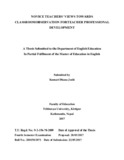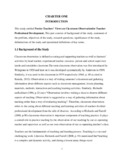Please use this identifier to cite or link to this item:
https://elibrary.tucl.edu.np/handle/123456789/1775| Title: | Novice Teachers’ Views towards Classroom observation for teacher Professional Development |
| Authors: | Joshi, Kumari Dhana |
| Keywords: | novice teachers’ views;classroom observation;professional developments |
| Issue Date: | 2017 |
| Publisher: | Faculty of Education Engish |
| Abstract: | This study entitled “Novice Teachers’ Views on Classroom Observation for Teacher Professional Development” aimed to identify novice teachers’ views on classroom observation in terms of classroom management, clarity of explanations, student engagement, patterns of interaction, use of a second language and delivery of instruction. Secondly, it had aimed to find out the importance of classroom observation from the perspective of novice teachers’ professional development. Keeping the objectives in consideration 30 novice English language teachers were selected from thirty different private secondary schools of Kathmandu district through non-random purposive sampling procedure. I used questionnaire as the research tool including 30 close ended questions and five open ended questions. After analysis and interpretation of the data, it was found that majority of the novice teachers of Kathmandu district seemed positive towards classroom observation in terms of different aspects of teaching and learning activities in the classroom. Furthermore, novice teachers opined that through classroom observation they could improve their skills and knowledge of different teaching and learning activities in terms of classroom management, delivery of instruction, pattern of interaction, clarity of explanation, use of a second language and student engagement from the perspective of their professional development. This study consists of five chapters. The first chapter deals with background of the study, statements of the problem, objectives of the study, research questions, significance of the study, delimitations of the study and operational definitions of the key terms. The second chapter deals with the review of theoretical and empirical literature, implications of the study andconceptual framework of the study. Likewise, the third chapter deals with the methodology adopted for the study in which, design of the study, population, sample and sampling strategy of the study, research tools sources of data, data collection procedure and data analysis and interpretation procedure of the study are discussed. The fourth chapter deals with the analysis and interpretation of the collected data descriptively and using simple statistical tool i.e. percentage. Similarly, the fifth chapter deals with the findings based on the analysis and interpretation of the data, conclusion derived from the findings and recommendations. This chapter is followed by reference and appendices. |
| URI: | http://elibrary.tucl.edu.np/handle/123456789/1775 |
| Appears in Collections: | English Language Education |
Files in This Item:
| File | Description | Size | Format | |
|---|---|---|---|---|
| cover.pdf | 502.12 kB | Adobe PDF |  View/Open | |
| Charter One.pdf | 990.11 kB | Adobe PDF |  View/Open |
Items in DSpace are protected by copyright, with all rights reserved, unless otherwise indicated.
